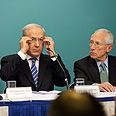
'Gov't policies widen gap between rich, poor'
Bank of Israel releases review of Israeli economy for 2011, says global, local trends led to social unrest. Fischer says economy could face trouble in 2013
The Bank of Israel submitted its report on Israel's economy for 2011 on Wednesday, a document that showed some positive trends but primarily focused on the developments that led to the eruption of the social protest last summer.
Bank of Israel Governor Stanley Fischer told reporters Wednesday that while the economy is doing relatively well this year, it could face trouble in 2013.
"The state of the economy is good, but not excellent," he said. "Our forecast is that the growth this year will reach a rate of 3.1%, a respectable growth but not on par with the average levels witnessed in 2004-2008."
Fischer noted that Israel's economy will require a growth rate higher than 10% next year in order to allow the government to stay within its deficit limit – a rate three times higher than the 3.1% predicted for 2013.
He added that if the government decides to increase the defense budget, it would have to be financed through tax hikes.
Fischer said that a mild reduction in poverty rates has been witnessed in recent years, a result of low unemployment rates.
"The standard of living within the middle class has grown in recent years as well," he said.
Housing costs main agitator
In the report, the Bank of Israel economists listed the rising housing prices as the foremost reason for popular discontent that caused the mass protests in the summer of 2011.
"The rise of rent prices in recent years has increased the burden on renters, who make up 30% of the households," the report read.
The economists acknowledged that the Bank of Israel's reduction of the interest rate to 0.5% in 2009 played a major role in driving the housing costs up, but stated that the lack of affordable housing and the absence of modern means of mass transport contributed to the housing shortage as well.
Another factor that awakened the protest movement is the increase in oil prices and certain food products. The bank's economists said that the public unduly blamed the growing gas prices on the government, even though the primary reason behind the trend was the global rise in the cost of oil. The recently imposed gas tax hikes were only part of the problem, the officials said.
Moreover, they noted, the global growth of grain prices and the absence of adequate competition have driven the costs of food up.
According to the report, policies aimed at cutting the budget deficit posed yet another impetus for the protest movement. The economists wrote that these policies, which include cuts in pensions and expenses on health, education and other services, were appropriate for 2003, when they were first implemented, and even helped the State to come out unscathed from economic crisis of 2008. But government expense cuts also increased the gap between the rich and the poor.
Tax reform widened class gap
The report leveled harsh criticism at the tax reform that was implemented by Prime Minister Benjamin Netanyahu's government and was later nixed at the Trajtenberg Committee's recommendation.
The income and profit taxes primarily benefited the rich, the economists wrote, claiming that the reform's bottom line meant that Israel was unable to provide services on par with other developed nations.
Addressing the report, Netanyahu lauded the economy's growth, but did not comment on the criticism.
"Israel's economy has grown by 4.7% last year, which is highly impressive, especially in light of the worldwide economic crisis."
He added that he was particularly glad to hear the inequality between sectors has stabilized, and that "poverty continued to drop. These are the biggest challenges faced by the government I'm heading."
Attila Somfalvi contributed to the report










